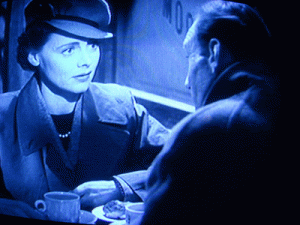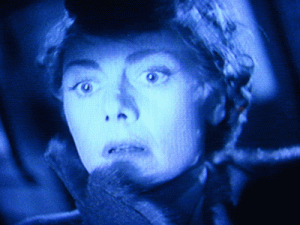 Brief Encounter, 1945. Directed by David Lean and written by Noel Coward. Starring Celia Johnson and Trevor Howard.
Brief Encounter, 1945. Directed by David Lean and written by Noel Coward. Starring Celia Johnson and Trevor Howard.
Sometimes it helps to escape a blue weekend with a mindless comedy, some blood and gore, or a spectacular adventure full of explosions. To wander into the local Cineplex with twenty bucks, grab your ticket, and check out from life for two hours. Look around you: every theater has its share of time-wasters, a brief moment in the darkness to distract you from the weight of the world. Sometimes, that is what movies are for.
Then again, sometimes it is good to give in, to allow some subtle little movie, a forgotten gem that you’ll have to rent and with which you’ll drink cheap red wine, to worm its way into your heart and shake you to your core. Despite the pain, and perhaps the sleeplessness (definitely the sleeplessness), this is often a good thing. A perfect example: Brief Encounter.
This is a simple film, about nothing more that two very good, very married people falling in love, deeply and passionately. It is from the hand of David Lean, notable for such Technicolor classics as Bridge on the River Kwai and Lawrence of Arabia, films that don’t have as much human emotion in their seven hours as this one does in one frame.
Encounter couldn’t have been made at any time other than 1945, and it couldn’t have been set anywhere but England. Part of its considerable tension lies in an old, English, don’t-rock-the-boat morality that was commonplace back then, when it was enough to make certain that your husband was well fed or your wife could get her cooking done in new pots and pans. Admire it for its deep respect of every character and the way it treats their feelings with utmost care. And then lay on your couch afterwards, close your eyes, and just stare out into dark space and feel for a moment. You’re alive.
Brief Encounter is the story of a nice woman, Laura Jesson, who gets an ash caught in her eye one afternoon while waiting for a train. Laura is played by Celia Johnson, and she is an absolute beauty: an actress of great emotional range who was willing to look ugly, willing to be silly and laugh like a donkey, but a woman who transforms herself into a swan at a simple glance–utterly magnificent. Every Thursday Laura retreats to town from the suburbs to buy groceries, check out a book, eat lunch, and watch a movie before returning home to pleasant domesticity. When she is stricken by the ash, the plain Dr. Alec Harvey (Trevor Howard), a family practitioner, politely offers his assistance, and plucks the mote from her eye. With that, they bid one another adieu.
But the next Thursday he runs into her outside the chemist’s shop. Later that same day, in a crowded restaurant, she sees the poor doctor looking for an empty seat: she offers him the last seat at her table. Easily, they drift into laughter, noticing a woman who abuses her cello, and later chuckle over Donald Duck in a smoky theater. “Let’s do this again!” the doctor pleads, having had more fun than he’s enjoyed in God knows how long.
The following week, they eat lunch again, and then, suddenly, without their knowing it (or even wanting it), they find that the hours of walking, of sharing observations of their staid world, after leaning forward hungrily during tea and discussing ideas they could never quite articulate in the past, they are in love. At one point, as Alec is talking, Laura is startled: he looks, to her, as energetic and beautiful as a small boy. It delights her. She doesn’t know why, only that it does, and with this enchantment, she is also quite terrified.
Laura tries the usual tactic, talking about the doctor to her husband, hoping that this collision between the two worlds will jar her into a sense of duty, will kill this growing and uncontrollable feeling. And where it might have in the past, perhaps, this tactic utterly fails: she sees Alec again, and they have no choice but to be lovers.
The film ends badly, cruelly. Brief Encounter seems, at times, to almost revel in the brutal emotional destruction of two kind and polite people. Their final meeting is thwarted by a local busybody, and as Alec leaves, forever from her life, all he can do is place a hand gently on her shoulder, unable even to kiss her good-bye, a kiss that every moviegoer longs for as much as Laura. Unable to stand the pain, she thinks to commit suicide by jumping in front of a train, but cannot. She has children, after all. Thank God for the children. What do we do if there are no children?
That this minor masterpiece is narrated by Laura, trying to explain her actions (in her head–not out loud) to her crossword-loving husband, makes it all the more difficult to watch. Both people are surrounded by the innocent, and Lean and screenwriter Coward have no intention of marginalizing the families of the lovers. This is a film about a force of nature, as every bit dangerous as a hurricane, nearly as deadly. This couple knows better, but they also know that the moments together were some of the best they have ever known. This affair has honed their souls and made them diamond-bright. They cannot, under any circumstances, give that up. It will define their lives.
As the train carries Laura away from Alec forever, she thinks–
This misery cannot last. Nothing lasts really, Neither happiness or despair. Not even life lasts very long…
Do not forget: It is because of that last line that her love for this man is so important, no matter the cost. Watch this film if you can, when your heart is sore and you feel silly and stupid and frustrated all the time for the things you want but worry you cannot have. The film is cathartic, to a degree: of course, nothing ever really works to salve melancholy and shame.
Think then, as you witness the torment that confronts Alec and Laura, that these clandestine meetings actually push them towards a spectacular grace. Be grateful, to whatever god you worship, for the blessed relentlessness of emotions. For even guilt, as James Dickey once wrote, is magical.

